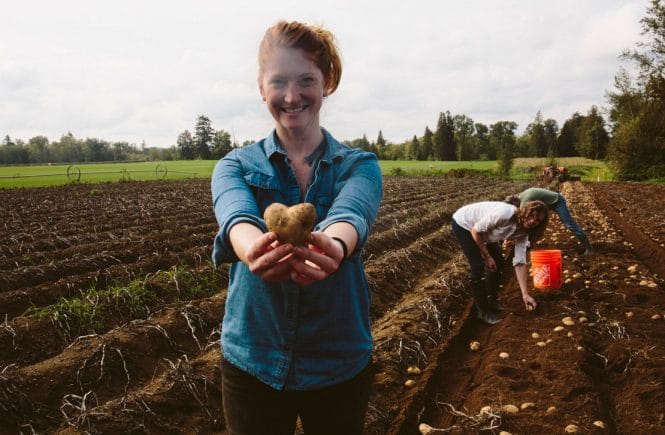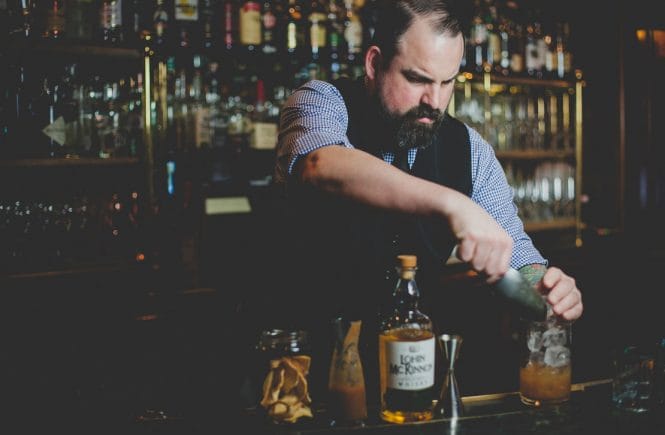How Canadian barkeeps and distillers are handling the trade war troubles

Last month at the “knowhere public house,” a locavore bar and community hub in Sudbury, Daniel Cronin hosted a five-course storytelling dinner billed as “The Night the White House Burned.”
The event had been inspired by the (possibly apocryphal) story of a lavish supper planned by then First Lady Dolley Madison, which was meant to be a victory feast for United States forces during the War of 1812. Instead, it was enjoyed by invading Brits—right before they burned down the White House.
“Yes, this was obviously a response to everything going on with the U.S. tariffs,” says Cronin, who acts as knowhere pub’s bar consultant. “I’m an American citizen, an expat living here in Sudbury, and it’s disappointing to see my country making far more aggressive choices than are necessary or smart for the greater peace of the world.”
Chef Gaetanne Larocque Canadianized the meal with local fare and each course was paired with punches made with ingredients such as sumac syrup, Ontario cider, Niagara vermouth and, of course, plenty of Canadian whisky—the only whisky from this continent they sell.
“It was easy for us to say, ‘We’re not buying American liquor right now,’” Cronin says, noting that they already had a strong Canadian whisky program. “There’s no point, there’s no need. I feel fairly confident in my ability to recommend a rye that has a similar profile to a specific bourbon if I’ve got a consumer who wants that.”
Changing habits
Although the spirits business isn’t as economically important as Canada’s auto, steel or lumber industries, which have all been affected by high tariffs unexpectedly levied by the U.S. government, the bourbon boycott has been a serious talker. Some provinces immediately pulled American wine, beer and spirits from shelves, whereas, in jurisdictions with private retailers, some U.S. products are still available.
“It’s definitely been challenging for certain people,” says Eric Scouten of Kakuteru Lounge in Saint John, New Brunswick. “Your general Old Fashioned drinkers are in the habit of ordering what they see as a simple order, but that’s no longer the case. It requires a longer conversation.”
And, of course, it’s not only bourbon. Wine lists at steak joints are traditionally heavy on the Cali Cab. Some people have reported problems sourcing tequila in provinces where Mexican spirits come through the States. And coffee liqueur is a surprising tough item to keep in stock.
“What’s been interesting is how many funny little things are produced in the United States that you don’t even think about, like Fireball or Butter Ripple Schnapps,” says Skye Plowman of the Trapline Lounge in Yellowknife’s Explorer Hotel. “Or Sour Puss. I’m not going to miss it personally, but that group that comes in on Friday nights to do Porn Star shots is missing Raspberry Sour Puss quite a bit right now.”
Perhaps not so much that they’d indulge in cross-border shopping, however.
Close to home
Polls show that Canadians are easing off travel to the U.S.A. for a range of reasons: to show support for our own economy stressed by the trade war; to protest a government callously deporting and detaining racialized populations; and, finally, out of fear for personal safety. No matter how remote the possibility is, given sensational accounts of Europeans and Canadians being detained by ICE (U.S. Immigration and Customs Enforcement), it’s hard to plan a trip to the U.S. without a flicker of a thought about what the odds are that you also wind up with a free excursion to El Salvador.
And, since the post-pandemic bar community in Canada is as international as it’s ever been (thanks to pop-ups, takeovers and enthusiasm for conferences), strained U.S.-Canada relations are starting to re-shape that, too. Even Tales of the Cocktail in New Orleans, a high-profile and nearly mandatory stop on the circuit, may see fewer Canadians this year.
“I do think a lot of people are quite serious about not going to Tales this year,” says Christina Veira, part-owner of Toronto’s Bar Mordecai. “I’ve heard it from a lot of people who work at a lot of levels of the industry, which makes me take it seriously.”
Veira points out that, for many, a sense of financial instability is part of the equation. Veira says few of her colleagues feel “flush” right now and, like many, are cautious about the future, given the simmering trade war. The fact that tariff announcements are capricious and ever-changing doesn’t make it any easier.
“We had been invited to do a pop-up in the States and we’re not doing it,” says Veira. “Any travel I have booked to the States right now is on the personal side and I couldn’t ask staff to travel since I could not, in good faith, say that my feeling of ‘it should be fine’ was enough.”
Veira says that bar owners might have an easier time at the border, since it represents a clear anchor at home. Bartenders without an ownership stake, on the other hand, might be subject to tougher scrutiny, since immigration agents might suspect they’re crossing the border to work under the table.
“I’m also aware that some members of the staff might not feel safe because of immigration status, gender, sexuality, what have you,” Veira adds. “Even if my body isn’t the most privileged, I have some and that gives me an illusion of safety.”
A silver lining
There’s been an uptick in conversations around exploring Asian, African and European events, as well as interest in homegrown conferences. The Bar Committee Nova Scotia group, chaired by Dylan Brentwood, are looking into reviving the defunct Drink Atlantic Cocktail Festival, which would be a lovely excuse to visit one of Canada’s most vibrant food, cocktail, wine and craft spirits destinations.
Although, we should also just go so we can hang out with Brentwood as he makes us drinks behind the wood at Bar Kismet, festival or not. The silver lining in this dark timeline is that it might move us to take stock of all the great things we have here in Canada. And that will be especially exciting if our new federal leader manages to get inter-provincial trade barriers axed this year.
“I think bartenders should see this as an opportunity to be creative and I think that the folks with the pocketbooks should be flexible with the fact that pricing is going to be dynamic,” she says. “We’ve spent so much time being told that this spirit from the States is better or this wine from California is better than ours, it’s time to really open ourselves to what might be new to you or new to the market.”
Plowman adds: “It’s going to take a lot of effort. It’s going to be super annoying. But it could also be a really fun opportunity.”
Elbows up across Canada
A selection of cocktails, beers and spirits using the slogan “Elbows Up”:
In March, Junction 56 in Stratford, Ontario, launched a ready-to-pour cranberry vodka cocktail under the name “Elbows Up.”
G&P on Main in Whitehorse added a new “Maply” cocktail to its menu in April using the rallying term.
At Compass Distillers in Halifax, the name refers to the latest spirit in its portfolio—a corn whisky.
This spring, Yellowbelly Brewery launched a lagered ale under the name “Elbows Up” that’s available in can format at Newfoundland Liquor.
The Irish Heather in Vancouver has been serving an “Elbows Up!” Old Fashioned made with Lot 40 Canadian Rye, describing it as an “American classic made with Canadian spirit.”




